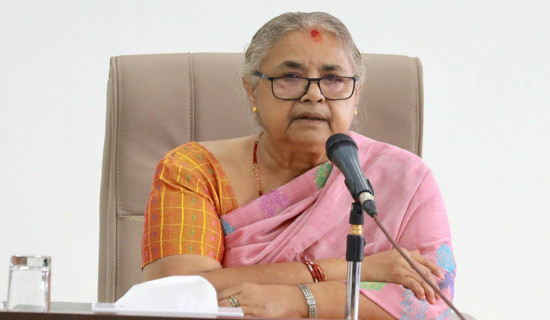- Friday, 13 February 2026
Democratising Party Leadership Essential
Around the world, voters appear to be turning away from traditional political organisations. The latest election results in Pakistan indicates that the traditional dynastic political parties like Pakistan People’s Party led by late Benazir Bhutto’s scion Bilwal Bhutto Zardari and Pakistan Muslim League (PML) led by Nawaz Sharif have been downsized and humbled by the impressive show of Pakistan Tehreek-e-Insaf (PTI) party headed by cricketer-turned-politician, Imran Khan, in the polls held for 336-seat Pakistan National assembly, of which 226 are decided through direct voting.
Imran Khan is currently in jail in cases related to corruption and leaking state secrets. He led protests against the country’s ruling dispensation after his shunting out from office in 2022. His conviction in a corruption case resulted in him being disqualified as a candidate. Moreover, Imran Khan’s party has been denied election symbols, forcing the candidates to run as independents. According to reports, Khan maintains widespread popularity among Pakistan’s largely young voters, who view him as a break from the political dynasties or military establishments that ruled the country for much of its independent history. In Pakistan, the Senate, the upper house of its parliament, has 100 seats. But unlike the National Assembly, the Senate is not elected directly. Its members are elected by the provincial assemblies. While the National Assembly (NA) has a tenure of five years, the Senate’s tenure is six years.
Upsurge of independents
The Senate, the NA and the country’s provincial assemblies combine to form the electoral college, which in turn elects Pakistan’s president. In the current polls of the NA, as mentioned above, the independent candidates - adherents of Khan leadership - have emerged victorious in the larger number of the constituencies, beating their rivals from the traditional parties long ruling the country. It is almost clear that Khan’s non-corrupt image and integrity was behind the impressive performance despite the much feared rigging and manipulation and on top that harassment of the ruling combinations. All odds were loaded against Khan and his party, but people's verdict blasted them to testify that his clean image and honesty had endeared him to the people, which led to harness their support in the polls.
Though Pakistan poll results alone cannot be alluded or generalised for the backsliding of the traditional political parties, there has been a global upsurge of the independents and new political formation characteried by the rise of the new alternative parties and leaders replacing the traditional parties and their obsolescent structures. Nepal is not an exception to it as new parties and independents have started to steal the political show, posing challenges to the traditional parties and leaders allegedly responsible for poor governance and weak development delivery. Though political parties are said to be the indispensable vehicles of democracy, they are blamed for failing to work to enhance and safeguard democratic values in accordance with the aspirations of the people.
The political leader who took cudgel against one’s own party lambasting the Maoist party that he worked with as key ideologue and started a new political formation was Dr. Babu Ram Bhattarai. In 2015 Bhattarai had left the UCPN (M), and the following year he founded a new party called Naya Shakti Nepal (New Force Nepal). In 2019 he oversaw the party’s merger with the Federal Socialist party Nepal, resulting in the formation of the Samajbadi (Socialist) Party Nepal. Ever since he left the Maoist party almost eight years ago and split with the Upendra Yadav-led Janata Samajbadi Party (JSP) two years ago, Bhattarai has been saying that the country needs a new force for the political, social and economic transformation of the country, arguing that such changes are not possible by the traditional parties.
Dr. Bhattarai leads Nepal Samajbadi Party (NSP) today, but this party is also under threat of split as one group within it is arguing for merger with the CPN-Maoist Centre. Dr. Bhattarai, as he admits, was not able to lend vigour and impart momentum to the new political force he had envisioned. But the country has several groups and bunch of leaders who indict the traditional political leaders and campaign for new and renovated version of politics and democracy. Both in hills and Madhes politics is being scripted anew with groups and leaders vying to take the centre stage to compete against traditional parties.
Katherine Ellison in her article titled “Can we have democracies without political parties” published in Knowledge Magazine (June 8, 2021) writes candidly with reference to the US: “The popularity of parties in America is at a nadir, with both the Democratic and Republican parties widely condemned as not only unrepresentative but also hijacked by elites. Indeed, a steadily increasing share of US voters identify as unaffiliated with either party. That proportion is now larger than the share of voters identifying with either Republicans or Democrats."
Direct democracy
Likewise, in Europe, for example, traditionally powerful centre-left parties are being accused of ignoring their voters, potentially contributing to a backlash that pushed the United Kingdom into Brexit. Political scholars have started to say that it's time to start visualising a more open and direct democracy, with less mediation by parties and professional politicians. Several trends have sped the declining popularity and power of the parties in the United States.
As argued by Katherine Ellison, the rise of independent political action committees in the US has given candidates a source of campaign funding outside the party channels that once dominated access to campaign money. This has made many candidates more entrepreneurial and less beholden to the party bureaucracy. The current global scenario thus indicates that traditional structuralist political parties across the globe have lost considerable goodwill and influence. However, as they are an important mechanism to link citizens with the state reforming parties and democratising leadership can restore the trust and confidence of the people.
(The author is presently associated with Policy Research Institute (PRI) as a senior research fellow. rijalmukti@gmail.com)

















